Mastering Blackjack: Expert Strategies for Winning
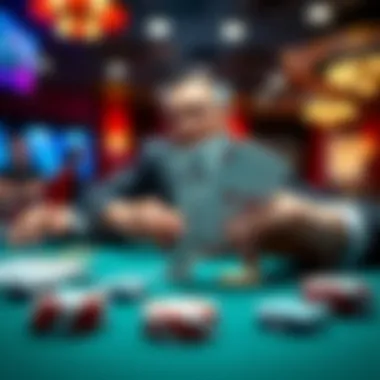

Intro
Blackjack, a staple of casinos worldwide, combines elements of skill and chance, making it both a challenging and exciting game. Whether you've just stepped into the vibrant atmosphere of a casino or you’re a seasoned player looking to refine your technique, understanding the nuances of blackjack is essential. This guide lays out foundational strategies and insights that help both novices and experienced players excel at the blackjack table.
This article will unlock the strategies professional players employ, from robust betting techniques to effective bankroll management. Moreover, it dives into the mechanics of the game itself to demystify what’s behind the cards. With this knowledge, every player can sidestep common pitfalls and elevate their game, improving not merely their odds of winning but also their overall enjoyment.
By melding experienced tactics with psychological insights, players can approach each hand with confidence. So, let’s embark on this journey to mastering blackjack and delve into the strategies that can tip the odds in your favor.
Understanding the Fundamentals
The journey into Blackjack begins with understanding fundamentals, which are paramount for both novice players and seasoned gamblers. This foundation extends beyond mere rules, influencing every decision made at the table. Mastering the basics not only empowers players with the knowledge to navigate gameplay effectively but also lays the groundwork for advanced strategies that can significantly tilt odds in their favor.
Blackjack has cultivated a reputation as one of the most exciting games in casinos around the globe. It’s not merely about luck; intimate knowledge of the game’s fundamentals can greatly enhance a player’s chances of success. The excitement heightens when players grasp how their decisions can impact outcomes. This insight can lead to more informed betting choices and a better handle on emotional reactions during play.
The Historical Context of Blackjack
Delving into the historical context of Blackjack reveals how it has evolved over centuries. Emerging roots can be traced back to 17th century France, where a game called "Vingt-et-un"—meaning twenty-one—gained notoriety. From there, the game traveled across the Atlantic and adapted within American culture, becoming the Blackjack we recognize today. The term ‘Blackjack’ itself stems from a special bonus payout offered when a player is dealt an ace of spades and a black jack—specifically, the jack of spades or clubs. This historical tidbit not only adds flavor to the game’s narrative but also underscores its deep cultural significance.
Understanding this backdrop helps players appreciate the game not just as a sequence of cards, but as a storyline crafted through time, reflecting moods and styles of play that span generations. Players who recognize this context might approach their gaming experience with added respect and seriousness, further enriching their strategic mindset.
Basic Rules of Blackjack
A clear grasp of the basic rules is essential when approaching a Blackjack table. Players compete against the dealer, aiming to have a hand value closest to 21 without exceeding it. The value of cards is simple enough: cards 2 through 10 are worth their face value, face cards (jacks, queens, and kings) each tally 10 points, and aces can be countde as either 1 or 11, depending on what benefits the hand the most.
Here’s a quick recap:
- The game begins with each player receiving two cards.
- The dealer also gets two cards, one face up and one face down.
- Players can choose to hit (take another card) or stand (keep their current hand).
- If a player’s hand exceeds 21, they bust and lose the round.
Grasping these rules sets the stage for more intricate strategies. Understanding options like doubling down or splitting pairs comes next, as players seek to optimize their wins in accordance with the house rules specific to their casino.
Card Values and Scoring
The card values and scoring in Blackjack play a crucial role in game dynamics. Players must consistently evaluate their hand against what the dealer shows. Knowing when to hit or stand can mean the difference between winning a hand and losing a bet. Here’s how card values can be summarized:
- Aces: flexible value—can be 1 or 11.
- Number Cards (2-10): their face value carries.
- Face Cards (Kings, Queens, Jacks): always valued at 10.
What’s more, the strategy lies in keeping track of how values interact during play. For instance, if a player holds an ace and a 10, they have a Blackjack—a hand valued at 21, considered the highest and often yields an automatic win unless the dealer also has a Blackjack. The beauty of scoring in Blackjack intricately weaves through strategies of hitting and standing. Players need to make split-second decisions that can drastically influence their success.
Overall, mastering the fundamentals enables players to transition smoothly into deeper strategies. With knowledge of the game's history, an understanding of its rules, and a firm grasp on card values, a player positions themselves favorably against the dealer. Each hand becomes not just a play but a calculated decision, deeply rooted in the fundamentals established right from the start.
Essential Strategies for Success
Mastering any game, especially one as rich and complex as blackjack, hinges largely on the adoption of effective strategies. The essence of blackjack transcends mere chance; it interweaves skillful decision-making with a keen understanding of probability. This section aims to illuminate essential strategies that not only bolster your gameplay but also enhance your overall experience at the blackjack table.
The Importance of Basic Strategy
At its core, basic strategy serves as the road map for any blackjack player. This approach is dictated by statistical probabilities derived from millions of hands played. While one might think that intuition or gut feelings play a crucial role, the fundamental takeaway is that understanding when to hit, stand, double down, or split can significantly lower the house edge.
Basic strategy charts outline these optimal plays based on your hand and the dealer's upcard. For example, if you're holding a hard 16 and the dealer shows a 7, basic strategy dictates that you should hit. Neglecting these guidelines often leads to lost opportunities and diminished returns. Familiarity with basic strategy enables players to engage with the game more confidently and informed.
Understanding the House Edge
Every casino game possesses a built-in advantage for the house. In blackjack, this edge varies based on rules, the number of decks in play, and the player's strategy. Understanding the house edge is paramount—it determines the likelihood of winning over the long term.
Typically, the house edge in blackjack can hover around 1% when you stick to basic strategy. However, introduce varied rules such as surrender options or side bets, and that edge can increase significantly. Recognizing these nuances fosters smarter gameplay. A savvy player will leverage this knowledge to dictate their betting and playing styles, minimizing the house's advantage and maximizing potential winnings.
Effective Betting Techniques
Once you've grasped the basic gameplay and house edge, the next logical step involves exploring effective betting techniques. One commonly employed strategy is the Martingale System, which entails doubling bets after each loss, thereby recovering previous losses when a win finally comes. However, tread carefully, as this can lead to substantial losses if streaks of bad luck arise.
Alternatively, adopting a flat betting strategy—wherein you wager the same amount on every hand—can preserve your bankroll while providing steady gameplay. This technique encourages mental discipline and reduces the risk of chasing losses. Whichever method you choose, it’s essential to know your limits and stick to a budget, thereby ensuring a more enjoyable experience at the table.


When to Double Down or Split
Knowing when to double down or split pairs can set the successful player apart from the rest. Doubling down is a strategic move that can elevate potential gains, as it allows you to double your wager when you feel confident about your hand. For instance, if you hold a total of 11, doubling down against a dealer's weak card, such as a 4, can be a smart move. The key is to recognize favorable scenarios where the odds tilt in your favor.
Splitting pairs allows you to create two separate hands from a pair, increasing your chances of winning. However, only specific pairs should be split under ordinary circumstances, like Aces and eights. Understanding the correct times to split paves the way for better outcomes and higher winnings.
Remember: Timing and understanding are everything when it comes to doubling down or splitting. It can be the tipping point between merely playing and winning big.
Adopting these essential strategies is not just about knowing what to do; it's about integrating these principles into your gameplay. Mastering blackjack takes time, practice, and a willingness to learn from each hand dealt. As you navigate the complexities of the game, let these strategies serve as your guide, leading you to make more informed decisions at the table.
For further reading on strategies and techniques, check out Wikipedia on Blackjack or insights from gamblers on Reddit's Blackjack forum.
Psychology of Blackjack
The mental game in blackjack is just as crucial as the strategies laid out on the felt. Understanding the psychology behind blackjack can significantly impact how a player performs, not only in terms of winning but in enjoying the game itself. Emotional control, awareness of human behavior, and the ability to adapt to the environment are paramount. It’s about harnessing the mind’s potential to make informed decisions rather than letting instinct and anxiety guide play. The psychological aspect enables players to build a solid foundation for their gaming experience, turning it from mere luck to a strategy-based endeavor.
Reading Opponents' Signals
When sitting at a blackjack table, every player is a storyteller in their own right, revealing subtle hints about their cards and strategies. Reading opponents’ signals can mean the difference between winning big or walking away empty-handed. A player’s posture, gaze, and even their breathing rate can provide clues to their confidence or hesitancy. For instance, if someone is tapping their fingers on the table, it may signal impatience or frustration.
Moreover, watch how players react when the dealer turns over their hole card. If a player seems exceptionally tense, they might have a hand they wish to hide or are grappling with the thrill of the game. Recognizing these cues can establish a psychological edge. Of course, it’s important to remember that not everyone plays with the same emotional transparency. Some players may be skilled at masking their intentions, which requires a keener sense of observation and intuition.
Managing Emotions at the Table
The rollercoaster of emotions in casino environments can be intense. Handling feelings such as anger, anxiety, or excitement can greatly influence a player’s decisions. If one feels like they’re riding a wave of bad luck, it’s easy to let frustration cloud judgment. In contrast, a winning streak can create an urge to go all-in, risking losses.
Players must develop methods to regain emotional balance. Taking a deep breath or momentarily stepping away from the table can help maintain clarity. It’s also crucial to maintain perspective on why one is playing—whether for fun or financial gain. Keeping one’s head straight, regardless of wins or losses, reflects a level of maturity that distinguishes a casual player from a seasoned one.
The Role of Patience and Discipline
In blackjack, a strategic mindset is not enough; patience and discipline are indispensable virtues. Many seasoned players attest to the idea that the game rewards those who wait for their moment rather than those who rush into decisions. It’s easy to feel pressured by the game’s fast pace, but disciplined play involves resisting impulsive actions.
Players should remind themselves that every hand is a new opportunity. Rushing through decisions leads to uncalculated risks and potential losses. By cultivating patience, players can observe the game flow, study opponents, and make wiser choices. Discipline is about sticking to a predefined strategy even when tempted to deviate. Knowing when to hold back or to aggressively pursue opportunities is where true expertise lies.
"In blackjack, like in life, the best decisions emerge when we think carefully and act with purpose rather than let our emotions steer the ship."
In summary, mastering the psychology of blackjack encompasses reading others, managing emotional reactions, and exercising restraint. Each of these aspects interlocks with strategic gameplay, creating a multifaceted skill set essential for success at the blackjack table. Understanding and harnessing these psychological tools offers a pathway not only to better gameplay but a deeper appreciation of the game itself.
Advanced Techniques for Experienced Players
As players dive deeper into the world of blackjack, they often seek methods that elevate their game beyond the basics. Advanced techniques are not just flashy tricks; they serve as potent tools for discerning players who want to tip the odds in their favor. Mastering these strategies can dramatically enhance one's success rate and overall gaming experience. Every card dealt becomes a new opportunity to apply strategic thinking, tapping into a wider spectrum of skills that go beyond mere chance.
Card Counting: Myth versus Reality
Card counting has long been a topic of intrigue, often portrayed in films and pop culture as a secret weapon for blackjack players. Surprisingly, card counting is not about superhuman intelligence or feats of memory. It relies on a fundamental understanding of how to track the ratio of high cards to low cards left in the deck. This technique can provide a player with insight regarding when the odds tilt in their favor.
It is crucial to debunk the myth that counting cards guarantees wins. Instead, it's more of a guide that helps players make statistically favorable decisions. The beauty of card counting lies in its simplicity; players can implement varying systems, such as the Hi-Lo method, which assigns point values to cards to create an overall count. When executed consistently, this can enhance betting strategies.
"Knowing how to count cards alone won’t make you a winner, but it sure helps you make better choices."
Here are some key points to keep in mind:
- Practice: Frequent practice is essential to develop a natural rhythm and accuracy in your counting.
- Discretion: Wearing a poker face while counting is paramount; attention from casino staff could lead to being banned.
- Adjusting Bets: Increase your bets when the count is high, as this is when the chances tilt in your favor.
Shuffle Tracking
Shuffle tracking, often considered the next step for those serious about improving their game, involves following specific groups of cards during the shuffling process. While it may sound complex, the concept is rather straightforward: an experienced player can recognize how shuffles may affect the order of cards. By keeping track of segments within a shuffled deck, players can anticipate when a run of high cards may come up.
Although shuffle tracking requires honed skills and significant practice, it can produce substantial winnings. It’s also essential to understand the limitations, as not all casinos shuffle in a predictable manner. Players need to be acutely aware of the dealer's style and the shuffling method utilized. Here are some considerations:
- Observation: Develop a knack for observing how the dealer shuffles and cuts the deck.
- Patience: Learn to wait for the right moment—impatience can lead to mistakes.
- Legal Risks: Always be aware of the legal implications of using advanced techniques in different gambling venues.
Ace Sequencing
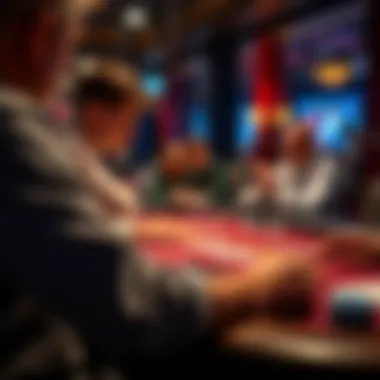
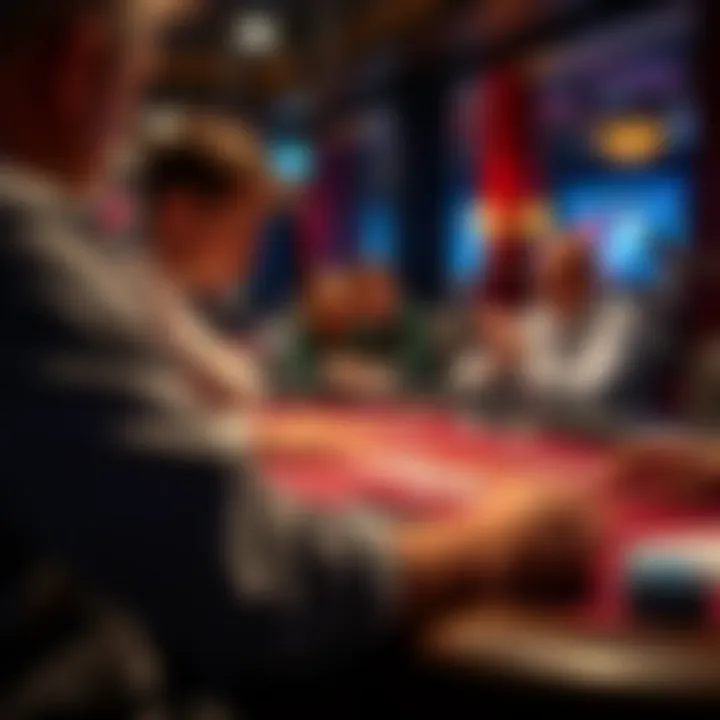
For the more daring players, ace sequencing is all about tracking the flow of aces throughout a game. This advanced strategy aims to capitalize on the fact that aces are often the most sought-after cards in blackjack due to their flexibility. By calculating and tracking the specific distribution of aces, players can often predict when they might hit one in the upcoming hands.
Yet like other advanced techniques, ace sequencing isn't just about luck; it requires meticulous focus, a good memory, and an ability to stay calm under pressure. Players also need to be cautious about the environment they're playing in, as these strategies can easily draw unwanted attention. Here are some crucial factors:
- Focus on Deck Composition: Understand how aces fit into the bigger picture of the deck mix.
- Timing: Similar to counting cards, knowing when to increase your bets based on the likelihood of drawing an ace can be profitable.
- Practice Makes Perfect: The more you practice this technique, the easier it becomes to integrate it into your overall gameplay.
Common Pitfalls and Mistakes to Avoid
Blackjack is more than just a game of luck; it's a cocktail of skills, strategies, and a tad of psychology. However, many players, even seasoned gamblers, stumble into traps that can cost them dearly. Recognizing and avoiding these common pitfalls is crucial for anyone looking to master the game. Understanding these missteps can help players protect their bankrolls and sharpen their skills, contributing to a more rewarding and enjoyable casino experience.
Chasing Losses
One of the most hazardous behaviors in gambling is chasing losses. This phenomenon occurs when a player, frustrated by a string of bad luck, doubles down on their bets in hopes of recouping the lost funds. The mindset is simple: if I just place a bigger bet now, I'll win it back! Yet, this approach is more likely to lead to deeper financial woes. Instead of stopping and reassessing, some players may find themselves digging a hole that gets harder and harder to escape.
It's important to remember that no amount of betting can change the odds of the game. The house always has an edge, and trying to chase losses often leads to irrational decisions. Players should adopt a clear strategy that includes taking breaks to avoid emotional decision-making, and be prepared to walk away rather than hoping for a miracle comeback.
Ignoring Basic Strategy Charts
Understanding and employing basic strategy charts is essential for success in blackjack. These charts, based on probabilities, outline the most effective actions a player can take in various situations. Ignoring these charts can be akin to sailing a ship without a compass.
Many players fall into the habit of depending on instincts or past experiences rather than the analytical advice given by these charts. However, even the best intuition can lead to costly mistakes. Not every player can ace every scenario; that's where this strategy comes in handy. By committing basic strategy to memory, players can minimize the house edge and make informed decisions that enhance their overall chances of winning.
Failing to Set a Budget
A surefire way to get into hot water at the blackjack table is by failing to set a budget. Without a clear financial boundary, players might find themselves wagering amounts they cannot afford, leading to stress and regrettable choices. Setting a budget isn't just about keeping track of winning and losing; it's about defining clear limits on how much one is willing to spend in a session.
Developing a budget could involve determining both a maximum loss limit and a win goal, thereby allowing players to establish clear targets. For example, if the loss limit for the night is $100, once that threshold is reached, it's time to call it a night. On the flip side, if you're ahead and reach your win goal, perhaps you should consider cashing out and enjoying your winnings.
In summary, avoiding common pitfalls is fundamental. Whether it's chasing losses, ignoring strategic charts, or neglecting to set financial limits, each mistake can amplify the risk and diminish the fun of playing blackjack. Keeping these pitfalls in mind helps create a more disciplined approach to the game, enabling players to enjoy every hand while making informed and rational choices.
Remember, gambling should be fun, not a source of stress. Knowing when to stop is just as important as knowing how to play.
The Role of Probability in Blackjack
Probability plays a pivotal role in the game of blackjack, acting as a guiding star for both amateurs and seasoned players alike. Understanding how probability influences every decision at the table equips players with the critical tools necessary to make informed choices that can enhance their chances of success. By grasping basic probability concepts, players can better navigate the ever-changing dynamics of the game.
Understanding Odds and Probabilities
When discussing the essence of blackjack, one must first understand the odds at play. The odds represent the likelihood of a specific event occurring — for instance, the chance of the dealer busting or of drawing a specific card. In blackjack, the fundamental aim is to beat the dealer’s hand without exceeding 21.
This game follows a basic principle: familiarizing yourself with the odds can drastically change your gaming experience. For example, if you are holding a total of 16 against a dealer's 10, the probability of going bust if you hit is significantly higher. In this example, understanding your odds means knowing when to take calculated risks and when to play it safe. Keeping track of cards previously played can further refine these probabilities, allowing players to adjust their strategies accordingly.
Additionally, the concept of the house edge comes into play. The house edge reflects the casino's advantage over the players and varies depending on blackjack variations. For instance, classic blackjack generally has a lower house edge when compared to other casino games, making it more favorable for players who employ the right strategies.
Statistical Analysis in Gameplay
Diving deeper into the numbers, statistical analysis is integral for serious players who aspire to improve their blackjack skills. Analyzing previous hands and outcomes offers valuable insights that can significantly impact one's gameplay.
For instance, utilizing statistical data to review winning hands can help identify trends. This may include pinpointing situations where certain strategies yield greater success over others, like knowing whether you should double down or simply stand based on trends observed. Here, players can use various statistical tools or even software to ensure accuracy and insights are rooted in actual data.
"In blackjack, making decisions based not solely on gut feelings but anchored in statistical analysis can turn the tables in your favor."
Moreover, incorporating concepts from probability theory, such as variance and standard deviation, allows players to gauge risk accurately. Players can learn, for example, how much variability to expect in their short-term results, helping them prepare for swings in fortune at the table.
In summary, the synergy between probability and blackjack is unmistakable. By decoding the odds and employing statistical analysis, players can cultivate a deeper understanding of the game and their strategies, giving them a shot at consistent success.
As players grow more adept at calculating probabilities, they not only elevate their gameplay but also derive greater enjoyment from each hand dealt, ensuring that the fundamental language of probability remains a key player in their blackjack journey.
Online Blackjack vs. Live Casino Experience
In the world of gambling, the dynamics of play can be vastly different depending on whether one chooses to sit at a digital table or a physical one. The nuances between online blackjack and live casino blackjack do not only affect the gameplay but also shape the overall experience. Understanding these differences is vital to mastering blackjack, as players may find themselves drawn to one method over the other depending on their preferences, backgrounds, and strategies. Both forms of play present unique benefits and considerations, making the choice more of a reflection on a player's personal style and aims.
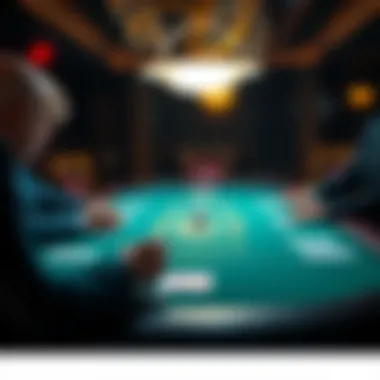
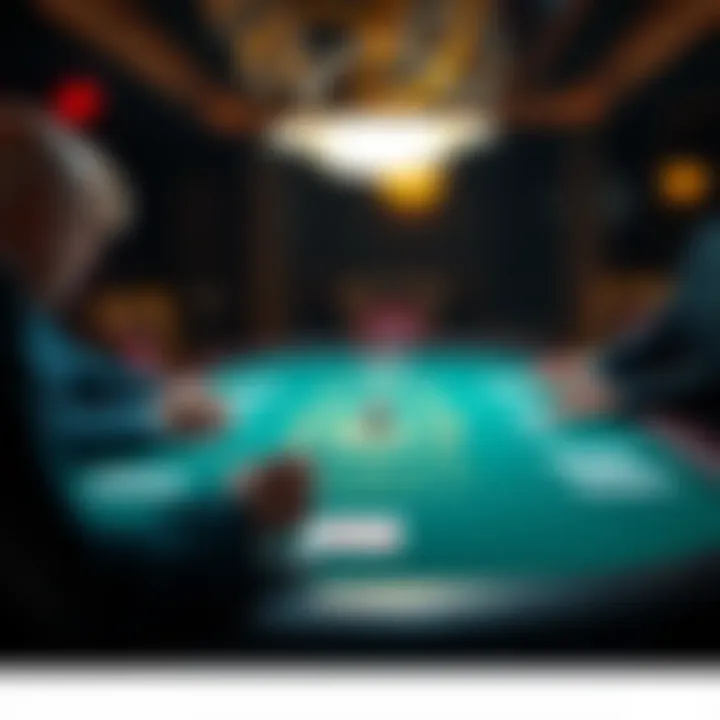
Advantages of Online Play
Online blackjack holds several compelling advantages for the modern player. One of the biggest draws is the accessibility it offers. You can log on at any hour, in the comfort of your own home or while on the go, eliminating the need to travel to a physical casino. Furthermore, players tend to find a wider variety of games online. From unique variations to innovative side bets, the range of choices is astonishing.
Some key benefits of online blackjack include:
- 24/7 Availability: No more worrying about the closing time of casinos.
- Lower Minimum Bets: Many online platforms offer lower stakes than you’d find at a live table.
- No Social Pressure: For some, interacting with other players can be daunting. Online, one can focus solely on their strategy.
- Bonuses and Promotions: Online casinos frequently offer enticing bonuses, which can be a significant edge for players looking to maximize their bankroll.
The Social Aspect of Live Blackjack
Meanwhile, the live casino experience brings with it a distinct social element that many gamblers cherish. The flair of interaction—whether it’s the camaraderie with other players or the dynamic between player and dealer—can greatly enhance the enjoyment of the game. In a live setting, one can engage in light banter, share tips, and build a sense of community, adding layers to the game that online play might lack.
For some, being able to read body language and expressions of fellow players aids in forming a strategy, thus influencing their decisions directly. It instills a feeling of real-time competition, transcending the solitary nature of online play. Indeed, the physical ambiance of a casino, with the sound of chips, cards shuffling, and the general buzz of excitement contribute to an unforgettable experience that few online platforms can replicate.
Choosing the Right Platform
With the proliferation of online blackjack options, selecting a trustworthy platform becomes paramount. Players should equip themselves with an understanding of what makes a site reputable. Here are some pointers:
- Licensing and Regulation: Always check if a casino is licensed by a recognized authority. Examples include the Malta Gaming Authority or the UK Gambling Commission.
- Game Variety: A reputable platform should offer not just blackjack but other games too, allowing players to diversify their enjoyment.
- User Reviews and Reputation: A glance at user feedback can provide critical insights. Sites like Reddit or TripAdvisor can give real opinions from fellow players.
- Managing Options: Look for platforms that offer easy deposit and withdrawal options, as well as responsive customer support.
These features will ensure that players enjoy a fun and secure environment, making their gambling experience all the more rewarding.
"Choosing the right platform is not just about the games it offers but also the safety and support it provides to its players."
Building a Personalized Strategy
In the intricate world of blackjack, personalizing your strategy could mean the difference between hitting the jackpot and watching your bankroll dwindle. A well-crafted personal strategy tailors to your unique playing style, allowing you to mitigate risks, maximize winnings, and enhance your overall gaming experience. This section emphasizes the importance of developing a personalized approach to playing blackjack, focusing on key elements, benefits, and considerations that can make all the difference.
Adopting a one-size-fits-all strategy is like using a rubber mallet when a fine hammer is needed. Every player has individual strengths, weaknesses, and risk tolerances. Evaluating your personal style of play will give insights into how you might approach various situations at the table. Understanding whether you prefer to play aggressively, conservatively, or somewhere in between will inform many of your decisions, from betting sizes to when to hit or stand.
"A good blackjack player is not just a master of the cards, but of their own mind."
Evaluating Personal Style of Play
Evaluating your personal style of play isn’t just about how you feel on any given day; it’s a systematic approach to understanding how you interact with the game. Here’s how to get started:
- Self-Reflection: Consider your emotional state while playing. Do you find yourself on edge, reacting impulsively? Some players thrive under pressure while others might crumble.
- Analyze Past Games: Look back on your previous sessions. Did you have more wins playing aggressively, or did patience pay off more often? Make notes of key moments to identify patterns.
- Scenario Testing: Experiment with different styles in low-stakes settings or practice rounds. Try a conservative approach one night and then switch it up the next to see which feels more natural and yields better results.
By understanding yourself, you can pave the path for a strategy that feels right, increasing your confidence while decreasing unnecessary risks.
Customizing Betting Patterns
Once you’ve got a grasp on your playing style, it’s time to focus on customizing your betting patterns. This is akin to a chef choosing individual spices, adjusting them to create a dish that’s tailored to personal taste.
Here are some considerations for custom betting patterns:
- Set Bankroll Limits: Know how much you’re willing to stake before entering the game. Divide your bankroll into smaller units for each session.
- Adapt to Table Conditions: If the table feels tight with players not taking risks, it might be a good opportunity to play more aggressively. Alternatively, if players are going for broke, a conservative strategy might secure a more favorable position.
- Change Betting Sizes By Situation: Avoid rigidly sticking to one betting strategy throughout the game. If you’re feeling lucky after an early win, increase your bets slightly to capitalize on momentum. If you’re facing a string of losses, consider minimizing your bets to conserve your bankroll.
Personalizing your betting strategy isn’t just about numbers; it’s a choreography of emotion, intuition, and analysis. By constantly refining and adapting your approach based on the observed dynamics at the table, you position yourself to be a formidable player.
Building a personalized strategy in blackjack is about awareness and adjustment, recognizing that no two games or players are alike. By dissecting your own tendencies and customizing your approach based on these insights, you increase your odds of mastering blackjack. For more detailed strategies and insights, referring to reputable sources like Wikipedia or forums such as Reddit can provide additional layers of understanding and perspective.
Culmination and Final Thoughts on Mastering Blackjack
Mastering blackjack involves a blend of knowledge, skill, and personal insight. Understanding how to navigate the complexities of the game can greatly enhance both enjoyment and profitability. This section consolidates key points, emphasizing the significance of reflection and adaptability in your game. As you stand at the table, the importance of embracing what you’ve learned becomes clear. The deeper your knowledge, the better your decisions will be. So, let’s unwrap some valuable takeaways.
Reflecting on Lessons Learned
Reflection is the bedrock of growth in any endeavor, and blackjack is no different. Every hand played—whether a victory or defeat—carries lessons that can shape subsequent strategies. For instance, if you find yourself frequently facing busts when taking a hit with the dealer showing a strong card, it might indicate a need to reassess your risk tolerance.
Consider writing down your experiences after each session. This journal can be a handy tool that charts your journey through the world of blackjack. It allows for a closer inspection of your decision-making patterns and betting behaviors.
Moreover, don’t shy away from analyzing the decisions of other players at the table. If someone seems to consistently win by doubling down at specific moments, take note. What drives their choices? How does timing and intuition influence their gameplay?
Continuing Education and Practice
The road to mastering blackjack doesn’t end with grasping basic strategies. Continuous education is paramount. Reading books, participating in online forums, or even watching tutorial videos can provide fresh perspectives. Websites like Reddit host lively discussions that can enhance your strategic acumen.
Additionally, practice can amplify your learning. Consider utilizing online simulators or downloadable apps designed for blackjack practice. These tools can mimic real-world scenarios and help build your confidence without the pressure of financial loss. Engaging in friendly games with peers can also boost your skills—in this dynamic, you can apply all that theoretical knowledge in practical settings, fostering both camaraderie and learning.















